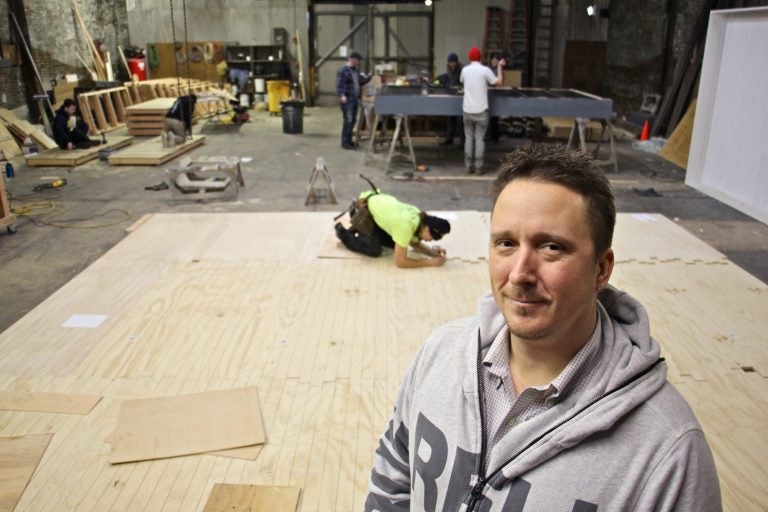Philly theaters form set-building company, hope to help stage redevelopment
A handful of small theater companies in Philadelphia have formed a collaborative set-building company.

Matthew Lewandowski stands in the Philadelphia Scenic Works workshop where set builders from three different small theater groups find space to work at the same time. (Emma Lee/WHYY)
Since 2006, whenever the Interact Theater company needed a new set for one of its plays, it called Britt Plunkett.
Plunkett ran a carpentry shop in West Philadelphia that catered mainly to Philadelphia theater companies. As a trained actor, he knew how to work with them to give them what they need at a price they could afford.
“The combination of great quality for a very low cost — and tremendous investment from him in our organizations — made for a wonderful situation,” said Seth Rozin, Interact’s artistic director. “We did not know how wonderful until he left.”
In 2016, Plunkett hung up his hammer to be a full-time dad to his newborn daughter. That left Interact and lots of other theater companies in a lurch, with the option of either hiring a professional set-building firm at very high costs or finding another independent carpenter whose quality might be be unreliable.
Last year, Rozin pulled together five local theater companies — Interact, Act II Playhouse, Theater Horizon, Pig Iron, and the Philadelphia Theater Company — to form Philadelphia Scenic Works, a nonprofit, set-building company.
“I’m a big proponent of collaboration, and not just because it saves money,” said Rozin, who also opened the Drake Theater two years ago as a collaborative performance venue. To his mind, this town is not big enough for everyone to go it alone.
“I’m a real believer that, if we’re not careful, we can max out the number of nonprofits trying to solve problems by themselves,” he said.

The Philadelphia Scenic Works was established in August in a former roofing warehouse in the Kensington neighborhood. Its chief attribute is its 10,000 square feet of work space, enough room for several theater companies to work on their respective sets — side by side, without getting in each other’s way — from construction to the paint deck to the loading dock.
“We have the Delaware Theater Company, Interact, and EgoPo all building here simultaneously,” said president Matthew Lewandowski last week.
Companies can send their own carpenters to Kensington to build sets, or ask PSW to tap its list of union and non-union carpenters to do the job. The company bought all the tools Plunkett used to have in West Philadelphia, including the massive CNC router, a computerized cutting machine that can do nearly anything.
“There are great artisans around town that just don’t have the proper space to work. So we’re providing that space,” said Lewandowski. “We’re also trying to provide a space for younger artists to come and learn from the older artists. So we’re developing the talent pool as well.”
The PSW is still being established. It’s been a busy six months, but that level of busy has to be sustained all year for the business model to work. Lewandowski has taken on other clients, including a design-and-build for a Mummers parade set and an installation for a gala in Fairmount Park.
To keep costs low for its primary client base — the city theater companies — Lewandowski can take on higher-paying corporate clients and leverage the company’s nonprofit status to bring in foundation money.
Philadelphia Scenic Works is taking up only half of its building; 10,000 square feet of vacant space is waiting for a tenant. The company has lofty ideas of filling it with a collective costume and prop storage facility, as well as luring theater companies into using the empty office suite on the second floor. Some of the cavernous garages, once used to store roofing materials, could be made into rehearsal spaces.
The founders envision remaking the entire building into an administration hub for Philadelphia’s independent theater scene and seeding economic redevelopment in the neighborhood.
That’s a tall order.
The site is barely a block away from the city’s bleakest blight: people addicted to heroin, displaced by the Conrail track cleanup, permanently camping under the Emerald Street bridge. Ground zero for Philadelphia’s opioid crisis is a stone’s throw away.
“That’s our front yard. We were very aware of that when we settled on this place,” said Rozin. “It’s several blocks from the heart of the Frankford Avenue redevelopment. That hasn’t reached us, yet. We hope to be part of that.”
WHYY is your source for fact-based, in-depth journalism and information. As a nonprofit organization, we rely on financial support from readers like you. Please give today.





